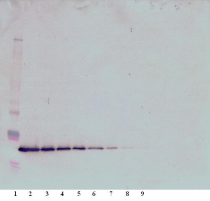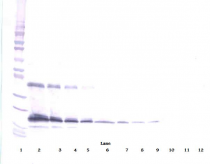ARG66013
anti-Tpo / Thrombopoietin antibody
anti-Tpo / Thrombopoietin antibody for ELISA,Neutralizing,Western blot and Human,Mouse
Overview
| Product Description | Goat Polyclonal antibody recognizes Tpo / Thrombopoietin |
|---|---|
| Tested Reactivity | Hu, Ms |
| Tested Application | ELISA, Neut, WB |
| Host | Goat |
| Clonality | Polyclonal |
| Isotype | IgG |
| Target Name | Tpo / Thrombopoietin |
| Antigen Species | Human |
| Immunogen | E. coli derived recombinant Human Thrombopoietin (Tpo). (SPAPPACDLR VLSKLLRDSH VLHSRLSQCP EVHPLPTPVL LPAVDFSLGE WKTQMEETKA QDILGAVTLL LEGVMAARGQ LGPTCLSSLL GQLSGQVRLL LGALQSLLGT QLPPQGRTTA HKDPNAIFLS FQHLLRGKVR FLMLVGGSTL CVRRAPPTTA VPSRTSLVLT LNEL) |
| Conjugation | Un-conjugated |
| Alternate Names | C-mpl ligand; Thrombopoietin; MPLLG; TPO; ML; Megakaryocyte colony-stimulating factor; Megakaryocyte growth and development factor; MGDF; Myeloproliferative leukemia virus oncogene ligand; MKCSF; THCYT1 |
Application Instructions
| Application Suggestion |
|
||||||||
|---|---|---|---|---|---|---|---|---|---|
| Application Note | * The dilutions indicate recommended starting dilutions and the optimal dilutions or concentrations should be determined by the scientist. |
Properties
| Form | Liquid |
|---|---|
| Purification | Affinity purification with immunogen. |
| Buffer | PBS (pH 7.2) |
| Concentration | 1 mg/ml |
| Storage Instruction | For continuous use, store undiluted antibody at 2-8°C for up to a week. For long-term storage, aliquot and store at -20°C or below. Storage in frost free freezers is not recommended. Avoid repeated freeze/thaw cycles. Suggest spin the vial prior to opening. The antibody solution should be gently mixed before use. |
| Note | For laboratory research only, not for drug, diagnostic or other use. |
Bioinformation
| Database Links | |
|---|---|
| Gene Symbol | THPO |
| Gene Full Name | thrombopoietin |
| Background | Megakaryocytopoiesis is the cellular development process that leads to platelet production. The main functional protein encoded by this gene is a humoral growth factor that is necessary for megakaryocyte proliferation and maturation, as well as for thrombopoiesis. This protein is the ligand for MLP/C_MPL, the product of myeloproliferative leukemia virus oncogene. Mutations in this gene are the cause of thrombocythemia 1. Alternative promoter usage and differential splicing result in multiple transcript variants differing in the 5' UTR and/or coding region. Multiple AUG codons upstream of the main open reading frame (ORF) have been identified, and these upstream AUGs inhibit translation of the main ORF at different extent. [provided by RefSeq, Feb 2014] |
| Function | Lineage-specific cytokine affecting the proliferation and maturation of megakaryocytes from their committed progenitor cells. It acts at a late stage of megakaryocyte development. It may be the major physiological regulator of circulating platelets. [UniProt] |
| Calculated MW | 38 kDa |
Images (3) Click the Picture to Zoom In
-
ARG66013 anti-Tpo / Thrombopoietin antibody WB image
Western blot: 250 - 0.24 ng of Human TPO stained with ARG66013 anti-Tpo / Thrombopoietin antibody, under non-reducing conditions.
-
ARG66013 anti-Tpo / Thrombopoietin antibody standard curve image
Sandwich ELISA: ARG66013 anti-Tpo / Thrombopoietin antibody as a capture antibody at 0.5 - 2.0 µg/ml combined with ARG66014 anti-Thrombopoietin (Tpo) antibody (Biotin) as a detection antibody. Results of a typical standard run with optical density reading at 405 - 650 nm.
-
ARG66013 anti-Tpo / Thrombopoietin antibody WB image
Western blot: 250 - 0.24 ng of Human TPO stained with ARG66013 anti-Tpo / Thrombopoietin antibody, under reducing conditions.










